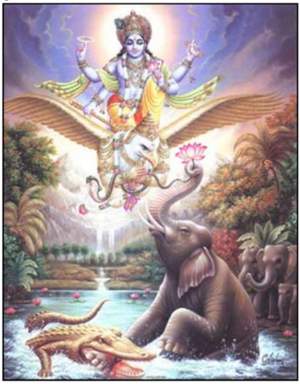Talk:Biological Species or Genus
By Vishal Agarwal
Even a human birth is not a prerequisite for devotion. Numerous scriptural narratives highlight how beings from sub-human forms have attained mokṣa through the path of bhakti.
"Bhakti is universal and accessible to all, including those in the humblest forms of life or circumstances, as its truths are timeless and can be embraced through tradition.Śāṇḍilya Bhakti Sūtra 78"
Once, Gajendra, the King of the elephants, along with his friends, wives, and children came to a splendid garden at the foot of a mountain that was surrounded by an ocean. Gajendra was happy with his life, and even arrogant, crushing numerous creepers and thickets on his way to the ocean, terrifying the large animals of the forest, yet showering his grace on the smaller creatures.
On reaching the ocean, all of them plunged into the water to cool themselves. Gajendra sprayed water over the females. The females and the young ones bathed and drank. They were all enjoying their picnic. Suddenly, a mighty alligator, which had become angry by this disturbance, seized hold of the elephant's foot and held it fast in his jaws.
When the wives of the elephant King saw that he was being dragged further and further into the ocean, they tried in vain to pull him back out. As the alligator and the elephant struggled with one another, the elephant became increasingly weaker while the alligator grew stronger.
When Gajendra saw that he could not free himself from the trap of the alligator’s jaws, he called out to Viṣṇu for help. He realized:
"These other elephants, my relatives, are unable to save me in my misery—how much less so can my wives! Caught in destiny’s snare embodied by this monster, I shall take refuge with the Supreme. There must be some Bhagavān who protects a frightened person who turns to him from powerful Death, running after him like a vicious serpent—I seek refuge with that God, whom death himself flees in fear."Bhāgavata Purāṇa 8.2.32–33"
The besieged Gajendra then sang a beautiful hymn of praise to Bhagavān Viṣṇu. Hearing the prayers of His devotee, Viṣṇu appeared mounted on Garuḍa, His vehicle bird. Gajendra was freed of course, but so strong is the purifying power of God that even the alligator was released from his ugly body and transformed into a Gandharva (a semi-divine being). The Gajendra-mokṣa is a beautiful tale of devotion and divine grace that continues to inspire millions even to this day.
In the Kāśīkhaṇḍa (chapter 48) of the Skanda Purāṇa is narrated the tale of an orphaned lady named Sulakṣaṇā, who decided to spend the rest of her life worshipping Śiva and Pārvatī after losing her parents. Every day, while she meditated, a goat would come and give her company. Due to this meritorious act, Pārvatī caused the goat to be born as a princess in the royal house of Kāśī and attain mokṣa thereafter.
In the spiritual tradition of Śrī Rāmānuja, another great saint named Pillai Lokācārya (1205–1311) was born a century later. Extremely pleased with him, Bhagavān Viṣṇu blessed him saying that whosoever associated with Lokācārya would also come to Viṣṇu with him. So compassionate was Pillai Lokācārya that thereafter, he would touch even ants lovingly and would stare at plants for a long time so that even the souls of these living beings would go to Bhagavān Viṣṇu.

